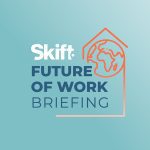Skift Take
There’s always a rush to jump on trends, blended travel included, but in some cases it’s worth stepping back once in a while.

Future of Work
As organizations start to embrace distributed work and virtual meetings, the corporate travel and meetings sectors are preparing for change. Read Skift’s ongoing coverage of this shift in business travel behavior through the lens of both brands and consumers.
Not all hotels should pursue remote workers, a hotel group CEO has suggested, because they mostly served their purpose during the pandemic.
It’s not a warning from a luxury hotelier, but one from Alastair Thomann, who leads boutique hostel-meets-hotel brands Generator and Freehand Hotels.
“We saw a lot of blended travel during the pandemic. The markets we cover are really high-compression markets around Europe and the U.S,” said Thomann at the inaugural Skift Global Forum East event in Dubai on Wednesday.
“What’s really changed now is that we don’t necessarily want that customer anymore, because that customer will spend a longer time in the hotel, they’ll expect a discount … we can sell our rooms at a much higher rate.”
Moderator Sean O’Neill, Skift’s senior hospitality editor, asked if he wanted people opening up their laptops in his lobbies.
“We’re going in the other direction,” Thomann replied during the How Blended Travel Is Reshaping Experience panel discussion. “We’re turning them into nightclubs. It’s all about how much money can we turn around in an hour. If somebody sits in there, with their laptop all day long and has three or four coffees, there’s better uses of space for us.”
The CEO later shared with Skift that one of its hotels in New York had even now removed charging points, to discourage people bringing in their laptops.
It’s a timely reminder to be careful not to follow trends blindly, but it’s perhaps also the location that counts. Compression markets are ones where hoteliers can generate a high revenue per available room, or RevPAR, and year-round occupancy. Currently there are many compression markets globally as demand recovers, but with the seemingly unstoppable rise of blended travel, is this really the best long-term view?
Sidenotes
Last year, expense company Emburse rounded off 2021 by publishing the craziest expenses it processed.
Not much has changed in 12 months, as submitters and finance professionals encountered even more silliness over the past two years.
But while 2021 was a year of extravagance, including $1,000 for a tattoo removal and $1,250 for pet sitting care, this year is a much more frugal affair.
Embruse has outlined several instances here, but let’s spare a thought for the employee who stocked up on three cases of ramen noodles for his meals, at a cost of $45, although they were in Covid-19 quarantine overseas.
But another worker opted to spend $110 on a tent, rather than pay $800 for a hotel room. The company’s vice president approved it, but it ended up being declined by the accounting department. Sometimes you just can’t win.
10-Second Corporate Travel Catch-Up
Who and what Skift has covered over the past week: Airbnb, Delta Air Lines, global events, Hilton, JetBlue, United Airlines.
In Brief
CAP Worldwide Serviced Apartments Expands in Asia
Business travel and relocation specialist CAP Worldwide has expanded in the Asia Pacific region with a new office. It has been operating in the region for thee years, but has now formally launched CAP Worldwide Singapore, and opened a regional service office in “The Hive,” located in Singapore’s Central Business District.
The opening completes a “tri-regional service delivery model” for its clients, following the launch of its Americas operation in August last year, according to CEO Jo Layton. The company added that it was also the latest stage in the development of CAP as a self-funded, certified women-owned business.
FairFly Takes the Strain Out of Changing Air Tickets
Israeli travel spend optimization platform FairFly has built a solution to automate the processing of miscellaneous charge orders, eliminating labor-intensive work for corporate travel agencies. It says the new feature, called introduces AutoMCO, will now free teams to concentrate on additional services for their customers. “Depending on the size of the travel management company, it might have to process 10 to 100 of thousands of Issuing miscellaneous charge orders. For each 10,000 orders, a travel management company is coping with, AutoMCO will save 2,500 productive hours,” the company claims.
The Daily Newsletter
Our daily coverage of the global travel industry. Written by editors and analysts from across Skift’s brands.
Have a confidential tip for Skift? Get in touch
Tags: business travel, corporate travel, digital nomads, dubai, expenses, Future of Work Briefing, hostel, New York, nyc, remote work, sgfe2022, skift live, Skift Pro Columns